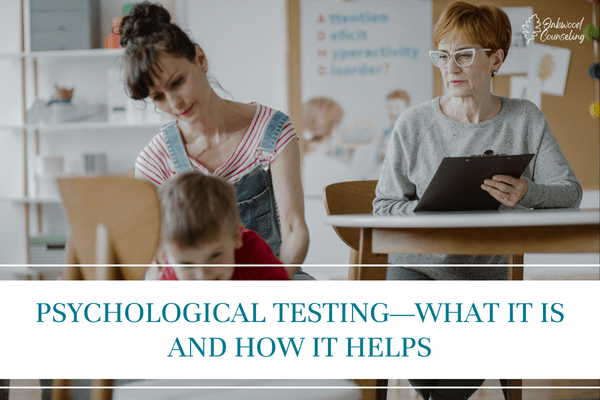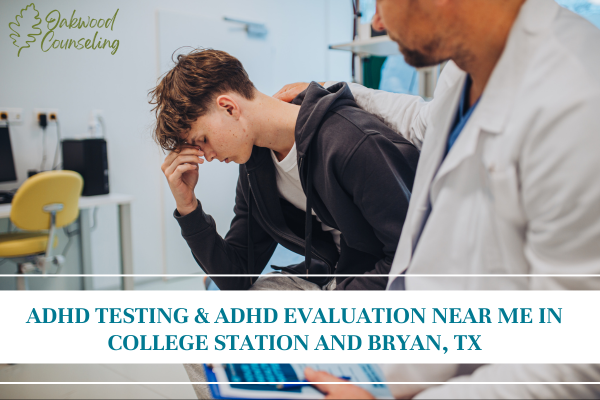Mental health is a crucial part of overall well-being, and psychological testing plays a key role in understanding and addressing various mental health challenges. Psychological testing is a structured assessment process used to evaluate cognitive, emotional, and behavioral functioning. At Oakwood Counseling, we provide comprehensive psychological testing to help individuals gain clarity, receive accurate diagnoses, and develop personalized treatment plans.
What Is Psychological Testing?
Psychological testing, also known as psychological assessment, is a method used by trained mental health professionals to measure different aspects of an individual’s mental and emotional health. These assessments involve standardized tests, clinical interviews, and observational techniques to provide a comprehensive understanding of a person’s strengths and challenges.
Psychological testing is commonly used for:
- ADHD Testing – Assessing attention, focus, and impulse control.
- Cognitive and Intelligence Testing – Evaluating learning disabilities, intellectual functioning, and identifying intellectual disability.
- Emotional and Personality Assessments – Understanding mood disorders, anxiety, depression, and personality traits.
- Behavioral Assessments – Identifying behavioral patterns that may impact daily life.
- Neuropsychological Evaluations – Examining brain function and its impact on cognitive and emotional health.
- Career and Vocational Assessments – Helping individuals determine career paths based on cognitive and personality strengths.
In many cases, the use of psychological tests allows counselors and psychologists to gather structured, measurable information that cannot be obtained through conversation alone.
Why Psychological Testing Is Important
- Accurate Diagnosis
One of the most significant benefits of psychological testing is its ability to provide an accurate diagnosis. Many mental disorders share overlapping symptoms, making it challenging to differentiate between conditions like anxiety, depression, and bipolar disorder. A thorough psychological evaluation ensures that individuals receive the correct diagnosis, allowing for targeted treatment strategies.
- Individualized Treatment Plans
Every person experiences mental health challenges differently. Psychological testing helps therapists develop an individualized treatment plan based on a person’s unique needs. For example, an individual diagnosed with ADHD may benefit from behavioral therapy, while someone struggling with depression may require cognitive-behavioral therapy. These results also provide treatment recommendations that guide long-term care.
- Identifying Strengths and Weaknesses
Testing not only highlights areas of difficulty but also identifies an individual’s strengths. This insight can be valuable for personal growth, academic planning, career guidance, and relationship building. Many people discover talents or cognitive abilities that they were not aware of before their assessment.
- Supporting Academic and Workplace Success
For children and adults struggling with focus, memory, or problem-solving skills, psychological testing can uncover underlying cognitive challenges. Schools and workplaces can then implement accommodations, such as extended test time for students or structured work environments for employees with ADHD.
- Early Intervention and Preventative Care
Early identification of challenges through psychological assessment services allows for timely support before conditions escalate. In children, this may mean improved development and educational outcomes. In adults, early diagnosis helps prevent chronic struggles that can affect relationships, work, and physical health.
- Improving Self-Awareness and Emotional Well-Being
Psychological assessments provide valuable insights into emotions, thought patterns, and behaviors. With this awareness, individuals can work with therapists to develop healthier coping strategies and make meaningful changes in their lives.
What to Expect During Psychological Testing
A comprehensive evaluation typically includes several steps to ensure accuracy:
- Initial Consultation – Often arranged after a referral question is raised by a primary care doctor, family members, or even an insurance company. This step includes a clinical interview, where the mental health professional gathers background information and reasons for seeking testing.
- Testing Sessions – Depending on the concerns, you may take standardized questionnaires, problem-solving tasks, or neuropsychological assessments. These sessions may last from one hour to several hours.
- Observation – Some assessments include observing behavior in specific contexts, especially for children.
- Test Administration – Tests are carefully given in structured clinical settings to ensure valid and reliable results.
- Scoring and Interpretation – Results are scored, often with computer systems, and compared to normative data. These test scores give a clear picture of cognitive or emotional functioning.
- Feedback Session – After analysis, the licensed psychologist provides results, discusses possible diagnoses, and outlines next steps with treatment recommendation.
Common Myths About Psychological Testing
- Myth: It’s just taking a test like in school.
Reality: Psychological testing is not about passing or failing. It is about understanding how your mind works. - Myth: Only people with severe mental illness need testing.
Reality: Testing is used for many reasons—academic planning, career counseling, workplace accommodations, and self-understanding. - Myth: Test scores define your worth.
Reality: Test scores provide data points, but they don’t define you as a person. They highlight patterns that can guide treatment and growth.
Benefits for Children, Teens, and Adults
Psychological testing can benefit individuals at every stage of life:
- Children – Helps detect ADHD, learning disabilities, autism spectrum disorders, and emotional concerns early.
- Teens – Assists with academic planning, career decisions, and emotional regulation.
- Adults – Supports career transitions, diagnoses conditions like anxiety, depression, or bipolar disorder, and guides therapy.
- Older Adults – Neuropsychological testing can detect cognitive decline, dementia, or memory problems early.
How Psychological Testing Supports Treatment
Psychological testing is not the end goal—it is the beginning of a treatment plan. With results in hand, mental health professionals collaborate with clients to design therapy approaches that match their needs.
For example:
- Someone with ADHD may receive structured behavioral interventions and workplace accommodations.
- A person with anxiety may benefit from mindfulness-based therapy supported by results from emotional assessments.
- A child with dyslexia may qualify for individualized educational support after achievement testing.
- Someone with bipolar disorder may benefit from medication management paired with therapy, with results informing treatment recommendations.
Choosing Psychological Assessment Services
When seeking psychological testing, it’s important to choose providers who offer psychological assessment services that fit your needs. Look for:
- Licensed psychologists or neuropsychologists with strong training in test administration and interpretation.
- Experience in handling specific referral questions, such as suspected learning disabilities or concerns about cognitive decline.
- A willingness to explain results in a clear, compassionate manner, and to provide additional information as needed.
- A commitment to building a treatment plan that aligns with your goals and involves family members when appropriate.
Achieving Mental Clarity
Understanding your mental health is a powerful step toward self-improvement. Psychological testing offers the insight needed to make informed decisions about treatment, accommodations, and personal growth. Whether you’re a parent seeking answers for a child, an adult facing workplace challenges, or someone looking for personal clarity, psychological testing can be an invaluable tool.
We’re Here to Help
If you or a loved one are experiencing symptoms that impact daily life, seeking psychological testing can be the first step toward clarity and effective treatment. At Oakwood Counseling, we provide psychological assessment services tailored to your unique needs. Our licensed psychologists work in professional clinical settings to ensure accuracy, compassion, and confidentiality.
If you’re ready to take control of your well-being, contact Oakwood Counseling today to schedule an assessment, and allow our team to provide a comprehensive evaluation that can guide your next steps with clear treatment recommendations.
Frequently Asked Questions
What is the best way to prepare for a psychological evaluation?
The best way to prepare is simply to get a good night’s sleep, bring any medical or educational records, and be honest during the clinical interview.
How long does a comprehensive evaluation take?
A comprehensive evaluation can take anywhere from a few hours to several sessions depending on the type of testing needed. Neuropsychological tests often require multiple hours.
Who performs psychological assessment services?
Only licensed mental health professionals, such as psychologists or neuropsychologists, are qualified to provide psychological assessment services and interpret test scores.
Can psychological testing diagnose all mental disorders?
While no test alone can diagnose every condition, the use of psychological tests combined with clinical interviews provides the most accurate method for diagnosing mental disorders.
How are test scores used?
Test scores are compared to standardized norms and help identify strengths, weaknesses, and possible diagnoses. They guide the development of a treatment plan.
What is the difference between psychological evaluation and neuropsychological testing?
A psychological evaluation is broad and covers emotional, cognitive, and behavioral health. Neuropsychological testing is more specialized, focusing on how brain function impacts memory, attention, and reasoning.
What happens during test administration?
During test administration, a trained professional guides you through standardized assessments. This ensures that the process is fair, accurate, and consistent. The environment is usually calm and supportive, so you can focus without distraction. The goal is not to judge but to gather reliable data for a comprehensive evaluation.
Are psychological evaluations only for people with mental disorders?
Not at all. While psychological testing is essential in diagnosing mental disorders, it is also widely used for educational planning, career guidance, and identifying personality traits that influence relationships or work style. Many people seek psychological assessment services simply to gain clarity and self-awareness.
Will my test scores be shared with anyone else?
Your privacy is protected. Test scores and reports are confidential and shared only with your consent. Sometimes results may be provided to schools, workplaces, or physicians if you request it and sign a release form.
Is neuropsychological testing different from other evaluations?
Yes. Neuropsychological tests focus specifically on how brain functioning impacts memory, reasoning, and attention. These tests are often recommended after brain injuries, neurological conditions, or when there are concerns about dementia. They are more in-depth than a standard psychological evaluation.
How do mental health professionals decide which tests to use?
Each case is unique. Mental health professionals select tests based on your concerns, medical history, and goals for assessment. For example, if focus is the main concern, ADHD-related assessments may be included. If memory loss is the issue, neuropsychological testing may be prioritized.
How do psychological assessment services help create a treatment plan?
The use of psychological tests provides measurable insights into your strengths and struggles. Combined with a clinical interview, these results guide the creation of a personalized treatment plan—ensuring therapy or accommodations are targeted and effective.




